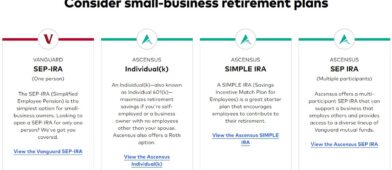Millions of American investors purchase certificates of deposit (CDs) at banks and credit unions. But did you also know that you can buy them through investment brokers? They’re called brokered CDs.
At their core, bank CDs and brokered CDs are the same product. But upon closer inspection, there are several key differences. These include how they are purchased, options for maximizing FDIC coverage, and other provisions. This article covers broker CDs and how they work to help you decide if they’re right for your portfolio.
Table of Contents
Bank CDs
Bank CDs are locked savings accounts provided by a bank or credit union. It’s a savings contract in which the bank promises to pay a fixed interest rate for a specific duration. Considered a safe investment, terms can range between three months to five years, though some banks will go as long as ten years. You can purchase bank CDs in denominations of $100 to as high as $100,000 or more.
Though the bank will pay the full interest if you hold the certificate to maturity, you can withdraw funds early. But if you do, there will be early withdrawal penalties. However, the bank will usually return the total amount of your principal to you.
Bank CDs are often recommended for balances under $250,000 since that is the maximum amount for FDIC will cover. (FDIC insurance coverage has a $250,000 maximum per depositor, per bank limit, for all funds held on deposit at a single institution.)
Brokered CDs
Brokered CDs are bank CDs bought by brokerage firms and other financial institutions (including financial planners, advisors, and consultants), then resold to consumers. Since they are bank CDs, they carry full FDIC insurance of up to $250,000.
But since a broker can offer investors CDs from multiple banks and credit unions, investors can benefit from effectively exceeding the total $250,000 FDIC limits while still enjoying the insurance protection.
Because they’re held in brokerage accounts, brokered CDs can be bought and sold on the secondary market, much like stocks and bonds.
How do Brokered CDs Work?
Brokered CDs can be bought as a new issue or from the secondary market in the case of existing certificates. Brokers find the highest rates, purchase large amounts of each CD, then sell portions to consumers at slightly lower interest rates.
Brokered CDs can have longer maturities than bank CDs. However, your money is not locked in, and you can retrieve your funds by selling the CD on the secondary market through the broker at the then-prevailing interest rate.
Brokers will set minimum investments, which can be $1,000, $10,000, or some other denomination. And while interest on bank CDs is paid upon maturity, brokers typically pay interest earned on the CD monthly.
Brokers can earn fees on brokered CDs in two ways. The first is through an interest rate spread. In a typical example, the broker will offer CDs paying 2.00% to its customers at a rate of 1.75%. The difference of 0.25% between the two rates is a fee to the broker.
The second scenario is a flat fee. The broker may charge a very small fee on a per CD basis. It may be a flat fee of $1, $10, or some other amount when you purchase a CD up to a certain dollar amount. Or it can be a percentage of the CD purchase, like 0.10%.
Callable vs. Non-callable CDs
Because brokerage firms sell them, brokered CDs have provisions bank CDs don’t. Brokered CDs can either be callable or non-callable. This is an important distinction and one you need to be aware of before investing in a brokered CD.
Callable CDs may involve the issuing bank terminating the CD before its maturity date. This may happen if interest rates drop to a certain point, usually below the rate on the CD. If the CD is callable, the bank will return your original investment, plus any accrued interest, as of the date the CD is called. If you plan to invest in a brokered CD, find out if it will be callable and that it’s a feature you’re comfortable with.
Non-callable CDs allow for a fixed interest rate over the full term of the CD, ensuring the CD will perform exactly as issued. This is the more predictable option since the bank cannot redeem the CD before maturity.
Are Brokered CDs Risky?
When buying CDs, the main rule is to avoid risk. Most brokered CDs are covered by FDIC insurance for up to $250,000, making it easier to have multiple CDs spread among different banks.
However, if you invest in a CD for an institution that FDIC does not cover – and it does happen on rare occasions – you could lose your entire investment if the issuer fails. Be certain the institution is covered under FDIC; otherwise, don’t invest in the CD. The FDIC provides recommendations on what to look for when buying brokered CDs.
The more common risk is that if you sell early, you can lose money. It all depends on the current interest rate in the secondary market. If you sell a 2.0% CD when the current rate is 2.5%, you’ll likely sell the certificate for less than you paid.
You should also be aware that selling a CD on the secondary market is not always easy. Unlike the stock and bond markets, the secondary market for CDs is minimal. There may be no buyers for your CD if you want to sell it before it matures. This is more likely to be a problem if interest rates have risen since you invested in the CD.
Comparison of Brokered and Bank CDs
Below is a summary of both brokered and bank CDs. It will help give you a clearer picture of how they work and the advantages and disadvantages each one offers.
Brokered CDs
- Offered through a brokerage firm, financial advisor, or financial planner who handles purchasing your CD(s).
- Technically, not FDIC-insured, but the banks that the CDs are issued by are (or should be), and your broker or financial institution is responsible for confirming that.
- You may be required to pay a fee to open a broker account, as well as a small fee for the purchase and sale of each CD.
- With access to the vast pool of banks and credit unions offering CDs, you can get better interest rates vs. dealing with a single financial institution.
- Longer maturities are available on brokered CDs, allowing you to enjoy the benefit of higher rates over longer terms.
- Brokered CDs can be callable, which is advantageous for the bank, but not for you.
- Potential to lose some of your investment if the CD is sold on the secondary market.
Bank CDs
- CDs will be limited to what’s available at each institution.
- Banks and credit unions rarely offer the highest rates on CDs.
- You must open your CD(s) at a bank or credit union.
- You’re responsible for ensuring your bank or credit union is FDIC-insured.
- There is generally no fee to open a CD with a bank or credit union.
- The issuing bank or credit union guarantees your investment principal, and ultimately by the FDIC should the institution fail.
- You will pay an early withdrawal penalty if you liquidate your CD before the stated maturity date.
- Interest earned on the CD will be available only upon maturity.
- Interest rates are fixed for the entire term of the CD.
✨ Related: What is an Interval Fund?
Is a Brokered CD the Right Choice?
Brokered CDs work best for investors with large investment portfolios. Since the FDIC insurance limit is $250,000 per depositor per bank, you would need to open CDs with four different banks to get the benefit of full insurance on a $1 million CD portfolio. But you can purchase multiple CDs from a broker, up to $250,000 per bank, and be fully covered by FDIC.
In theory, you can invest $25 million in CDs at 100 banks, each fully FDIC insured.
Brokered CDs also offer an opportunity for higher interest than you earn at an individual bank or credit union. You can shop for banks and credit unions paying the highest rates on CDs, but brokers offer a one-stop shopping advantage. And since brokers actively search for the best paying CDs, you’ll be able to determine where to invest your money quickly.
A brokered CD can also enable you to lock in a higher interest rate for a longer term. While individual bank or credit union CDs often have a maximum period of five years, brokered CDs often have terms of 10 years or more.
The Bottom Line on Brokered CDs
Regular CDs purchased from a single bank or credit union will be more than enough to satisfy most investors. The big question they have to answer is whether a CD is the best investment given the limited growth potential.
On the other hand, if you’re in the market for a CD but want to invest more than $250,000 with the potential for higher rates, brokered CDs are worth looking into.




Reinforcing and expanding on the simplicity of purchasing brokered CDs – with a spousal revocable trust most banks make it a laborious process to open a new account to acquire the CD. They want both of us to appear and sign signature cards. However, my existing broker account allows me to shop from the comfort of home, at all hours, and there are no additional applications or paperwork required. They will also happily make CD ladders using standardized or customized processes. The mechanics are similar to placing a stock purchase transaction. This is a lot easier than going to multiple… Read more »